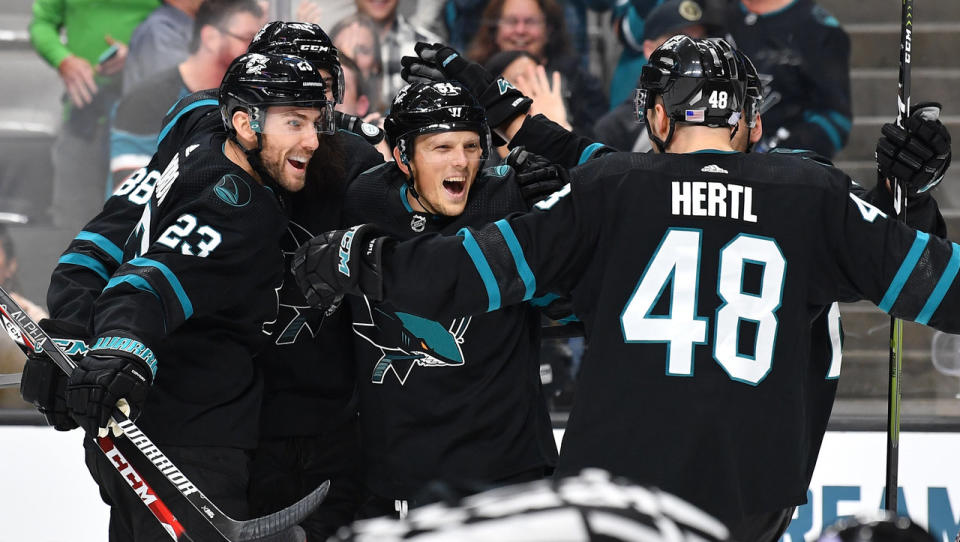How Sharks have turned around their awful start to season

The San Jose Sharks started the season abysmally: They went 4-10-1, and got outscored 36-56 along the way.
For a team this talented to be a minus-20 in goals with only nine points from almost 20 percent of its season is unforgivable. Even if it’s a PDO thing. Which, to be clear, percentages were certainly a part of it.
As discussed time and again, the Sharks entered the year with a reasonable bet that their goaltending would rebound. Martin Jones, after all, had never been as bad as he was last year. Except he started out even worse: The Sharks got an .873 save percentage at 5-on-5 through the first 15 games, with the league average closer to .915. That’s not to say the defense was good, because it wasn’t; the Sharks absolutely bled scoring chances and, as a consequence, the expected-goals against piled up in a hurry.
But to compound that issue, the Sharks also shot 6.7 percent, the seventh-worst number in the league. Add in the fact that the offense was horrid, generating the third-fewest expected goals and shots on net per hour, and it’s a recipe for disaster. Even if Jones and Aaron Dell had been average, the team’s play wasn’t enough to put them into a position to succeed.
While the Sharks should not have been this bad, it’s worth noting that they certainly played badly as well, turning in an effort through Nov. 2 that was among the worst in the league. The bad PDO just made things look and feel much worse.
But since Nov. 5, things have been very different. They’re 9-1-0, outscoring opponents 35-27, and are now very much back in the playoff picture. The PDO at 5-on-5 is still kinda bad, just not as inexplicably bad as it was. The goaltending has been (very slightly) better, but the big turnaround is in shooting percentage, where the Sharks are closer to 11 percent over the last 10 games. Which, obviously, helps get you to 37 goals on 289 shots.
What’s interesting is that some of the underlying numbers have improved substantially, but still remain more or less average in the grand scheme of things. If you want to say the extra juice they’ve gotten (outperforming expected goals substantially, but still struggling to keep the puck in front of their own goaltenders) is because of talent level, I’d allow that to a certain extent.
A lot of Sharks fans have pointed to a potential cause here: The return of Radim Simek to the lineup, which happened one game after this hot streak officially started. Adding Simek, in and of itself, isn’t going to be what swings you from simultaneously horrible and underperforming to decent and over-performing. He’s simply not that kind of player. Probably no one besides the truly, truly elite guys can make that big of an impact just by getting healthy.
But what Simek’s addition to the lineup did is simple. His partner all of last year was Brent Burns, and they did well together. When he was out, Peter DeBoer felt he had little choice but to put Marc-Edouard Vlasic, whose usefulness as a shutdown defenseman is decaying rapidly, on Burns’s pairing. It went very poorly.
Now that Simek is back, Burns is playing better. Not great or anything, mind you, but he’s not getting caved in every time he comes over the boards. Vlasic, instead, is paired with Erik Karlsson, and the results are likewise not great (46 percent xG at 5-on-5, yikes) but they’re better than they were (39.4 percent with all other pairing partners).
And while you can do these types of splits for a few guys, it’s at least safe to say that Simek’s return stabilized the defense and gave DeBoer the flexibility to put everyone in a position to succeed. Which, hey, he definitely shouldn’t need to if he has both Karlsson and Burns at his disposal, but that’s life sometimes. Especially if management has little to no desire to actually affect change on its own.
So it turns out the solutions, to some extent, really were in that room. But like the Blues last year, the Sharks needed a hot run just to (barely) make up for the fact that they started out so badly.
The fact is they’re not playing especially well now, but they do have enough talent that they don’t have to blow the opponents out of the water (as they did last year) to be in a position to win more often than not.
All they really need is to just count on the goaltending holding up. Which…
Ryan Lambert is a Yahoo! Sports hockey columnist. His email is here and his Twitter is here.
All stats/salary info via Natural Stat Trick, Evolving Hockey, Hockey Reference, CapFriendly and Corsica unless noted.
More NHL coverage from Yahoo Sports

 Yahoo Sports
Yahoo Sports 



